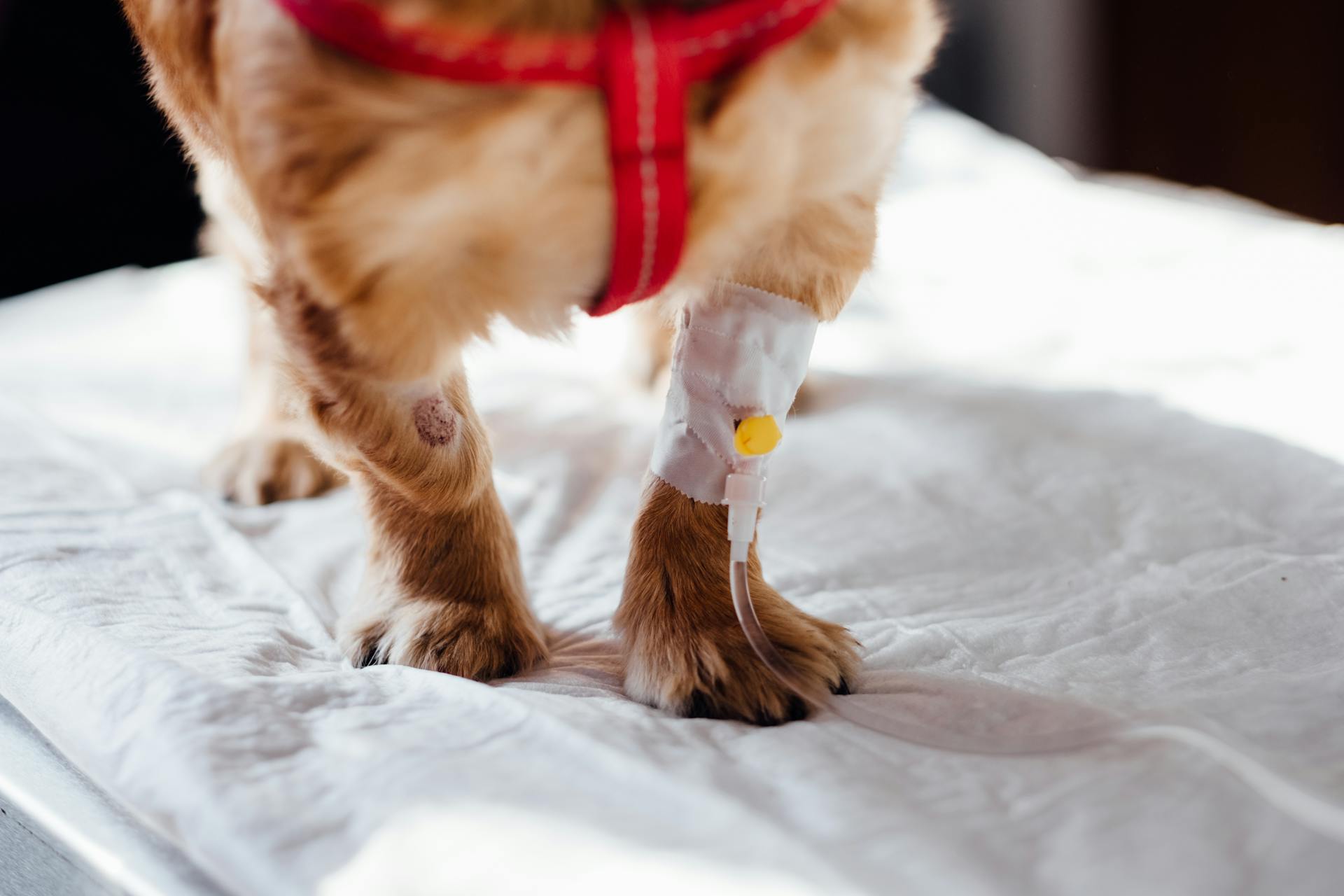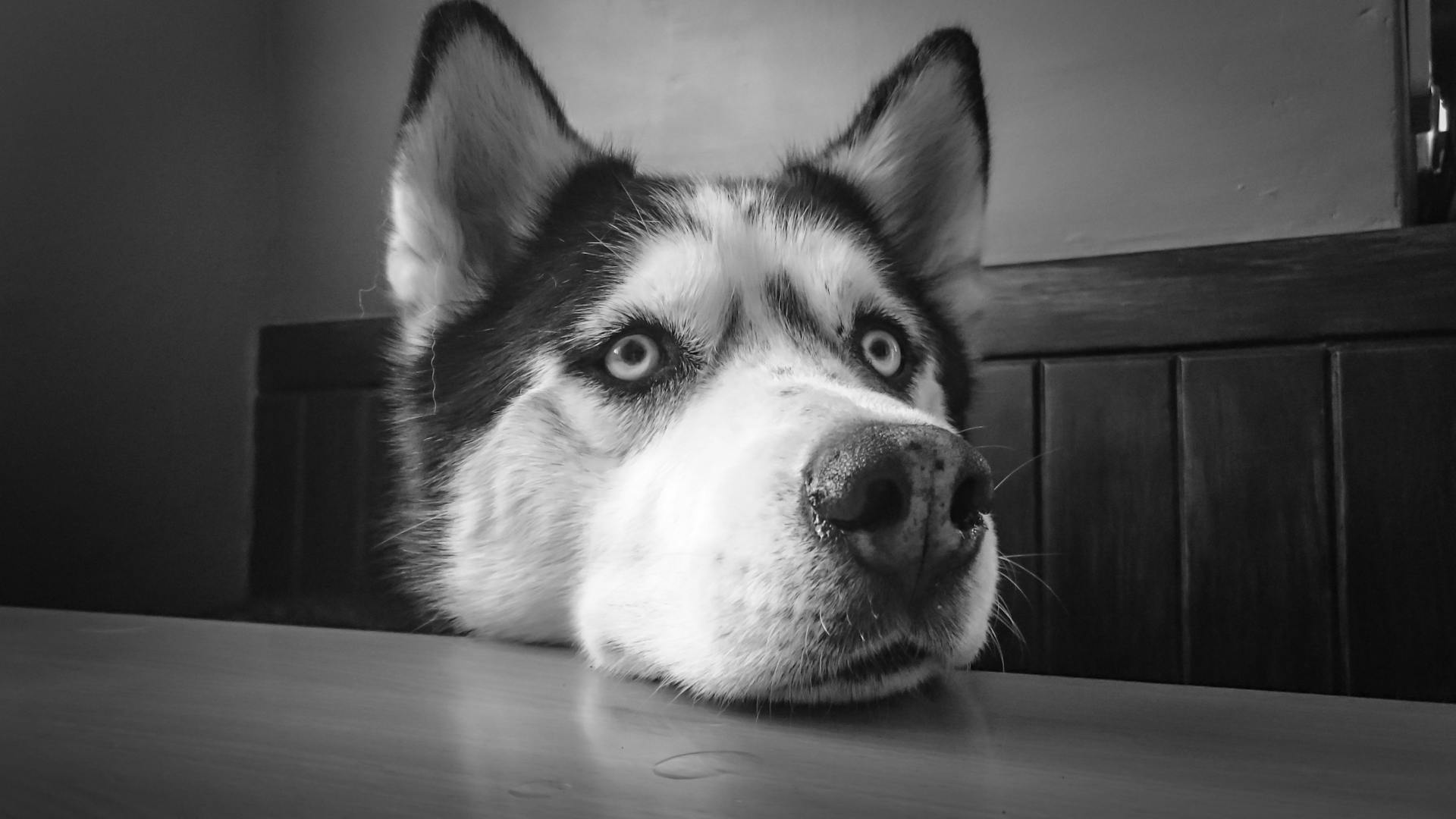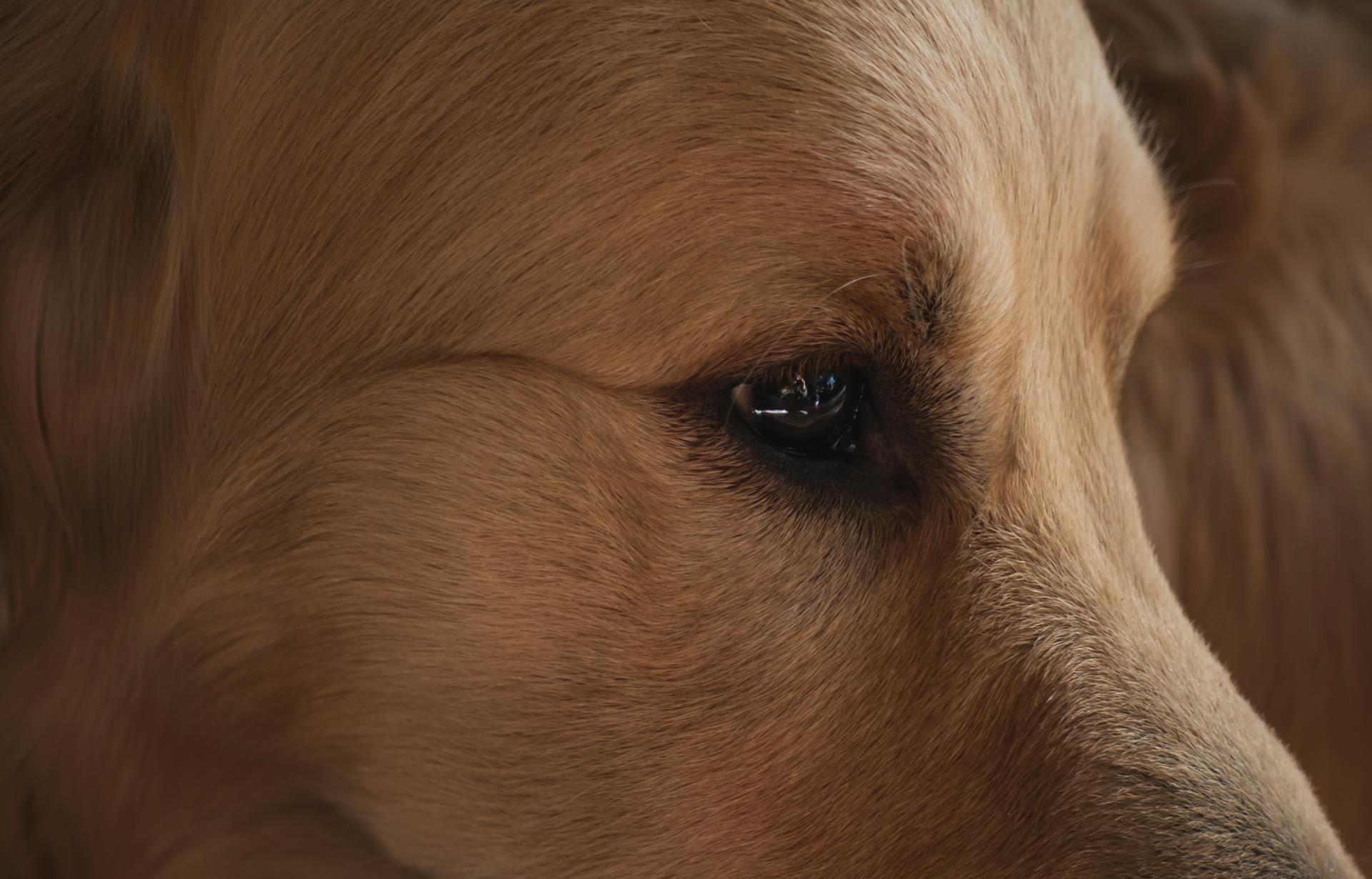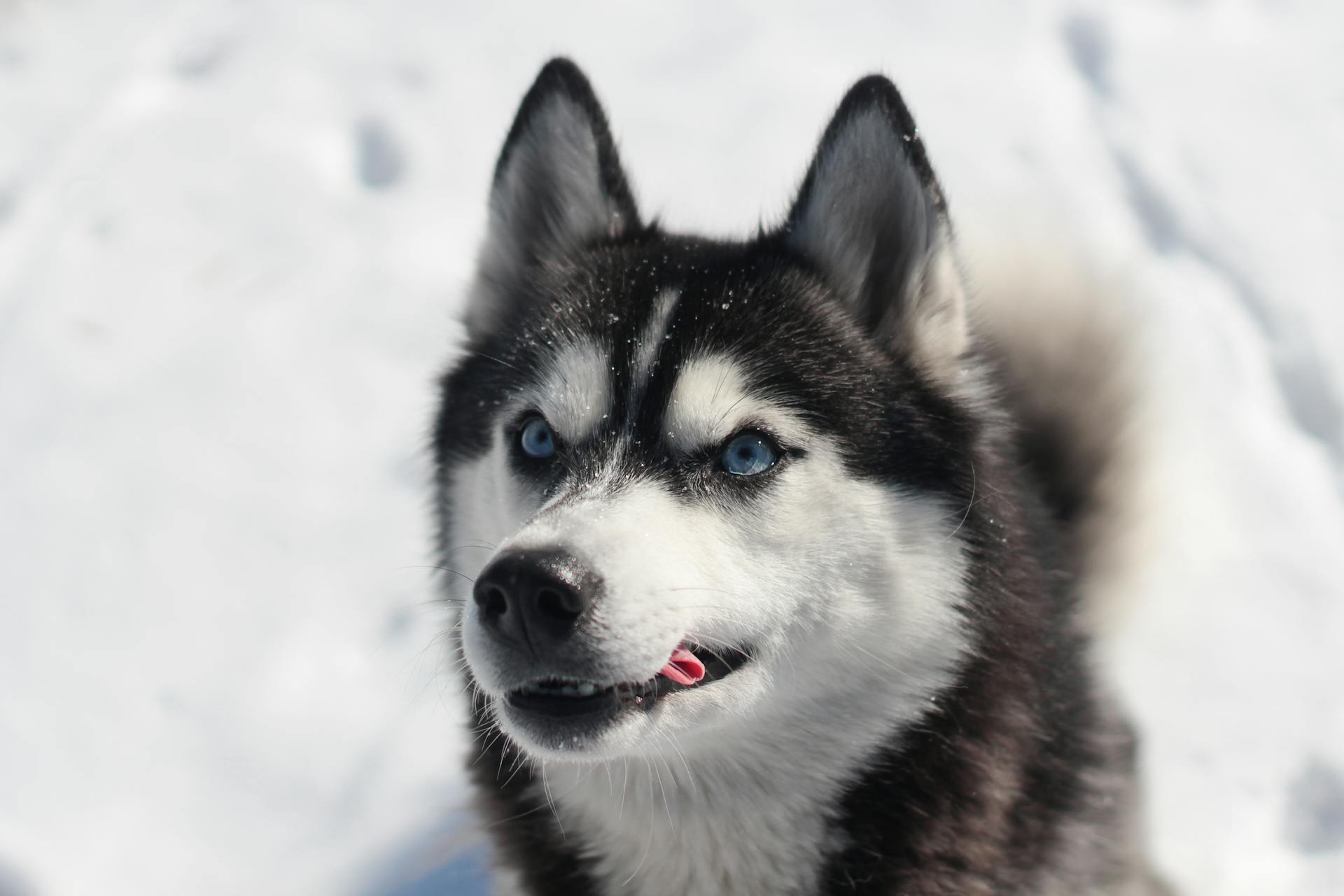
Pomsky dog health issues can be a concern for many owners.
Pomskies are generally a healthy breed, but like all dogs, they can be prone to certain health issues.
Hip dysplasia is a common concern in Pomskies, as it can lead to arthritis and mobility problems later in life.
Their small size means they can be more susceptible to hypoglycemia, or low blood sugar, especially if they don't eat regularly.
Regular feeding and monitoring can help prevent this issue.
Pomsky Health Issues
Pomskies are generally healthy dogs, but like all breeds, they are prone to certain health issues. Hip dysplasia is a common health problem that Pomskies may experience. This genetic condition affects the hip joint, causing arthritis and pain.
Pomskies with hip dysplasia may have difficulty walking, running, or climbing stairs. Hip dysplasia occurs when the hip joint doesn't develop properly, leading to a loose and unstable joint.
Here are some common symptoms of hip dysplasia in Pomskies:
- Limping
- Trouble walking up or down stairs
- Reluctance to get up or jump
- Shifting weight to front legs
- Loss of muscle mass in back legs
- Hip pain
Responsible Pomsky breeders use DNA testing to avoid passing on the health conditions Pomeranians and Siberian Huskies are predisposed to. This can help minimize the risk of hip dysplasia in Pomskies.
Common Health Issues
Pomskies are generally healthy dogs, but like all breeds, they are prone to certain health issues. These can include obesity, which is a common problem in Pomeranians due to their small size and tendency to overeat.
Pomeranians are also prone to overcrowding of their teeth, which can lead to various teeth and gum problems, such as tartar or plaque buildup. This can cause gingivitis or other gum diseases, leading to premature tooth loss.
Allergies are another common health issue in Pomskies, which can cause inflamed and itchy skin, recurring ear infections, hair loss, or other symptoms.
Here are some common health issues to be aware of in Pomskies:
- Obesity
- Teeth and gum problems
- Allergies
- Patellar luxation
- Heart disease
- Puppy hypoglycemia
It's essential to keep an eye on your Pomsky's health and take preventative measures to avoid these issues. Regular veterinary check-ups, a balanced diet, and plenty of exercise can go a long way in keeping your Pomsky happy and healthy.
Allergies
As a Pomsky owner, it's essential to be aware of the potential for allergies in your furry friend. Pomskies may develop allergies to certain foods, environmental factors, or parasites such as fleas.
A fresh viewpoint: Cavapoo Food Allergies
Symptoms of allergies in Pomskies include itching, redness, and skin irritation. If you suspect that your Pomsky has allergies, take them to the vet for an allergy test.
Pomskies can be allergic to various substances, including plants, pollen, and food. This can cause inflamed and itchy skin, recurring ear infections, hair loss, or rarer symptoms such as sneezing, coughing, and GI problems.
Managing allergies in Pomskies requires a combination of treatments, including identifying and avoiding allergens, controlling itching, keeping the coat clean and healthy, medication, and immunotherapy (i.e., an allergy vaccine).
A unique perspective: Grapes Dog Poison Symptoms
Genetic Concerns
Pomskies are generally healthy dogs, but like all breeds, they are prone to certain health issues. Genetic health concerns related to their Husky and Pomeranian heritage are a concern for potential owners.
Patella luxation, or slipping kneecaps, is a common issue in Pomeranians, which can be influenced by both genetic and environmental factors. Environment, as well as genetic influences, play a big part in the health of your Pomeranian.
Feeding your puppy a balanced diet may help prevent many health problems, including Pomeranian joint issues later in life. A proper diet and exercise can improve patella luxation issues in Pomeranians.
Pomeranians can experience heart issues, ranging from highly minor to life-threatening. Heart problems are associated with genetic factors and poor lifestyle, including poor diet, obesity, and lack of exercise.
Some Pomeranian heart problems may be detected in a puppy's lineage, and reputable breeders should have information on a puppy's lineage to help determine if heart issues run in the family.
Here are some common genetic health concerns in Pomskies:
- Patella luxation: a slipping kneecap issue
- Heart disease: ranging from minor to life-threatening
- Hypothyroidism: a condition where the thyroid gland doesn't produce enough hormones
Patellar Luxation
Patellar luxation is a common health issue in Pomeranians and other toy dog breeds. It occurs when the kneecap luxates, or pops out of place, either in a medial or lateral position.
Symptoms of patellar luxation include limping, bunny-hopping, and a popping or cracking knee joint. These signs can vary in severity and may not be noticeable until the condition has progressed.
Pomeranians can be affected by patellar luxation as early as eight weeks of age. This is why it's essential to have all breeding stock examined for this condition as young as 6-8 weeks old.
Any licensed veterinarian can examine a dog and submit findings to the Orthopedic Foundation for Animals (OFA). This is a quick and easy process that can be done in about 30 seconds.
Pomeranians with a patella grading over two should be removed from any breeding program. This is because bone deformities and loss of cartilage can develop in untreated cases, leading to ongoing discomfort and potentially severe health issues.
Feeding a balanced diet and keeping your Pomeranian trim and fit can help prevent many health problems, including Pomeranian joint issues later in life. Avoiding excessive jumping and providing a safe environment can also help reduce the risk of patellar luxation.
Mental
Mental health is a top priority for Pomskies. They require mental stimulation to stay healthy and happy.
For another approach, see: Dog Mental Health Therapy

Interactive toys can provide hours of entertainment and challenge their problem-solving skills. Puzzle toys, treat-dispensing toys, and interactive balls are great examples.
Regular exercise is also essential for Pomskies. They have a lot of energy and need plenty of opportunities to run and play.
Daily walks, playing fetch, and agility training can help keep them physically and mentally fit.
Hypoglycemia
Hypoglycemia is a serious condition that can occur in puppies under the age of 3 months or small breeds of dogs. It's caused by a sudden drop in blood sugar levels.
Low-quality or insufficient food can lead to hypoglycemia in puppies, so it's essential to discuss your puppy's diet with the breeder before bringing them home. Excessive exercise or overhandling can also cause a puppy's body to require more sugar than is available.
A puppy with hypoglycemia will be lethargic and lack energy due to a lack of glucose, which is the body's primary source of fuel. In severe cases, a puppy can seize, become comatose, and even die.
Suggestion: Boston Terrier Body
If you suspect your puppy has hypoglycemia, you should immediately supply glucose. Karo Syrup and honey are excellent sugar options that can be given to your puppy. Contact your veterinarian right away.
The signs of hypoglycemia can appear quickly and include weakness, loss of appetite, lack of coordination, shaking, muscle twitching, or seizures.
See what others are reading: Doberman Pinscher Ear Cropping
Breathing
As Pomeranians age, breathing problems become more common, so it's essential to pay attention to their patterns and habits to spot potential issues early.
Abnormal breathing in Pomeranians can be a sign of illness, so any unusual sounds like wheezing or gagging should be reported to a vet.
Coughing is another abnormal breathing symptom that requires veterinary attention.
Pomeranians may also experience breathing difficulties due to their small size and compact chests, which can make breathing more labored.
If you notice any of these abnormal breathing symptoms in your Pomeranian, don't hesitate to consult with a veterinarian to rule out any underlying health issues.
A fresh viewpoint: Why Do Yorkshire Terriers Lick so Much
Eye and Ear Health
Pomskies are prone to eye problems such as cataracts, glaucoma, and progressive retinal atrophy, which can lead to vision loss and blindness if left untreated.
Regular eye exams by a veterinarian can help detect these issues early on, allowing for prompt treatment. It's essential to take your Pomsky for regular eye check-ups to catch any problems early.
Pomskies may develop tear stains, but while most dogs with tear stains are healthy, sometimes tear stains can be a sign of an underlying problem. Let your veterinarian know if your Pomsky suddenly develops tear stains.
To find a board certified ophthalmologist in your area, visit the American College of Veterinary Ophthalmologists website at www.ACVO.org. Certification is valid for 12 months from the date of the eye exam, and annual re-examination is recommended.
Here are some common eye problems in Pomskies:
- Cataracts
- Glaucoma
- Progressive retinal atrophy (PRA)
- Tear stains
It's essential to check your Pomsky's ears at least once a month, watching for signs of an ear infection, including redness, debris, odor, and pain. If you notice a change in your dog's ears, contact your veterinarian.
You might enjoy: Bichon Frise Ears
Eye Problems
Eye problems can be a significant concern for Pomsky owners. Pomskies are prone to eye problems such as cataracts, glaucoma, and progressive retinal atrophy.

These conditions can lead to vision loss and blindness if left untreated. Regular eye exams by a veterinarian can help detect these issues early on, allowing for prompt treatment.
It's essential to take your Pomsky for regular eye check-ups to catch any problems early. Clear, bright eyes are a sign of good health, but discharge, bloodshot eyes, or clouding of the lens are all reasons to get your Pomsky checked out by a vet.
Pomskies may develop eye conditions such as cataracts, glaucoma, and progressive retinal atrophy (PRA). These conditions can cause vision loss or blindness if left untreated.
You can visit the American College of Veterinary Ophthalmologists website to find a board-certified ophthalmologist in your area. Certification is valid for 12 months from the date of the eye exam, and annual re-examination is recommended.
Here are some common eye problems in Pomskies:
- Cataracts
- Glaucoma
- Progressive retinal atrophy (PRA)
- Tear stains (which can be a sign of an underlying problem)
If you suspect your Pomsky has cataracts, it's essential to take them to the vet for a proper diagnosis through ultrasounds, blood tests, and possibly an electroretinogram.
Reverse Sneezing
Reverse sneezing in Pomeranians can be a common occurrence, often triggered by excitement or physical activities like eating, drinking, or pulling on the leash.
This phenomenon is known as a Pomeranian reverse sneeze, characterized by rapid, forceful inhalation of air through the nose, resulting in repeated snorts that can sound like choking.
Excitement is a common culprit behind Pomeranian reverse sneezing, so it's essential to keep your furry friend calm and composed.
A Pomeranian reverse sneezing episode typically lasts a few seconds, but some dogs may experience it for a few minutes and several times a day.
To help your Pomeranian through a reverse sneezing episode, try softly massaging his throat or gently shutting his nostrils until he swallows.
Ear Care
Regular ear checks are crucial for your Pomsky's health. Make it a habit to check their ears at least once a month, perhaps during bathing or brushing.
Redness, debris, odor, and pain are all signs of an ear infection. If you notice any of these symptoms, contact your veterinarian right away.
Ear infections can be painful for your dog, so it's essential to catch them early.
Nutrition and Feeding
Pomskies require a well-balanced diet to maintain their health and energy levels. Adult Pomskies should be fed twice a day, while puppies may require more frequent feedings.
It's essential to choose high-quality dog food specifically formulated for small breeds. Avoid feeding table scraps or human food, as these can be harmful to their health.
Your veterinarian can help determine the best type of food for your Pomsky based on their age, size, and health history. They can also recommend a feeding schedule and portion sizes tailored to your dog's needs.
To ensure your Pomsky gets the nutrients they need, look for dog food that contains the following essential nutrients:
- Protein (from sources such as chicken, turkey, or fish)
- Omega-3 and Omega-6 fatty acids (found in fish oil or flaxseed)
- Vitamins A, C, and E (found in fruits and vegetables)
- Calcium and phosphorus (for strong bones and teeth)
By following these guidelines and consulting with your veterinarian, you can help keep your Pomsky healthy and thriving.
Dental Problems
Dental problems are a major concern for Pomeranians, and it's essential to address them through proper nutrition and feeding.
Pomeranians are prone to dental problems due to their small mouths and overcrowding of teeth, which can lead to tartar and plaque buildup.
Regular tooth brushing is crucial to prevent these issues, and it's recommended to brush your Pomeranian's teeth daily.
Dental biscuits and chew toys can also help keep your dog's mouth clean, making them a great addition to their diet.
A healthy diet is vital for maintaining a healthy mouth, and dry food is a better option for your dog's teeth than canned or moist food.
Poor-quality foods high in starch or sugar should be avoided, as they can exacerbate dental problems.
Pomeranians can be prone to gingivitis and premature tooth loss if plaque is not removed, making regular dental care a must.
Regular health checks with a vet, including checks on your Pomeranian's mouth, can help identify and treat problems early on.
Readers also liked: Preventative Care Keeping Your Pet Healthy Year-Round
Dog Feeding Guidelines
Feeding your Pomsky the right way is crucial for their health and happiness. Adult Pomskies should be fed twice a day, while puppies may require more frequent feedings.
It's essential to choose high-quality dog food that's specifically formulated for small breeds. You can find this information on the dog food label or by consulting with your veterinarian.
Pomskies require a well-balanced diet that's rich in protein, healthy fats, and essential vitamins and minerals. This includes protein from sources like chicken, turkey, or fish, as well as omega-3 and omega-6 fatty acids.
Your veterinarian can help you determine the best diet for your Pomsky based on their age, size, and health history. They may recommend a specific type of food or supplements to ensure your Pomsky gets all the nutrients they need.
To transition your Pomsky to a new diet, it's best to do it gradually over a week or two to avoid upsetting their stomach. You can also ask the previous caregiver about the food they've been feeding your Pomsky.
Here are some essential nutrients that your Pomsky needs:
- Protein (from sources such as chicken, turkey, or fish)
- Omega-3 and Omega-6 fatty acids (found in fish oil or flaxseed)
- Vitamins A, C, and E (found in fruits and vegetables)
- Calcium and phosphorus (for strong bones and teeth)
To prevent obesity and other health problems, it's essential to monitor your Pomsky's portion sizes and ensure they're getting regular exercise. You can also give them dental biscuits or chew toys to help keep their teeth clean.
Exercise and Care

Pomskies are an energetic breed that requires daily exercise and mental stimulation to remain healthy and happy.
They need at least 30 minutes of exercise per day, but they can handle more if they are given the opportunity. This can include walks, runs, hikes, or playing fetch.
Pomskies also enjoy participating in dog sports such as agility or obedience training.
To prevent boredom, they require mental stimulation, which can include puzzle toys, training exercises, or interactive playtime with their owner.
Pomskies are not well-suited for apartment living or a sedentary lifestyle, they thrive in homes with yards or access to outdoor spaces where they can run and play.
You might like: How Much Exercise Do Labrador Retrievers Need
Exercise Requirements
Pomskies require at least 30 minutes of exercise per day to stay healthy and happy.
They can handle more exercise if given the opportunity, and it's great to see them running around and playing fetch.
Pomskies also need mental stimulation to prevent boredom, which can be achieved with puzzle toys, training exercises, or interactive playtime with their owner.
Additional reading: How Much Exercise Do Pit Bulls Need
They enjoy participating in dog sports like agility or obedience training, and it's a great way to bond with your Pomsky.
Pomskies are not well-suited for apartment living or a sedentary lifestyle, and they thrive in homes with yards or access to outdoor spaces where they can run and play.
With the proper exercise and mental stimulation, Pomskies can be a healthy and active breed, but owners need to be committed to providing them with the necessary activity to ensure their well-being.
Coat Care
Taking care of your Pomsky's coat is a crucial part of their overall health and happiness.
Brushing is essential to prevent matting and tangling, and most Pomskies need to be brushed two to three times a week using an undercoat rake or slicker brush.
Focus on areas like behind their ears, the backs of their legs, and behind the elbows and armpits, as these areas tend to accumulate loose hair.
Pomskies should be bathed about once a month, but during spring and fall when the undercoat sheds, take your Pomsky to the groomer for a de-shedding shampoo and blowout to keep your house and dog clean.
The exact coat grooming routine depends on the dog and the coat type, so it's essential to tailor your approach to your Pomsky's specific needs.
Standard-coat Pomskies require brushing at least once a week, while plush-coat Pomskies need to be brushed at least twice a week, and wooly-coat Pomskies require several brushings a week, along with a sanitary trim every two to three months.
Here's a brief summary of the coat types and their grooming needs:
By following these guidelines, you can help keep your Pomsky's coat healthy, shiny, and looking its best.
Featured Images: pexels.com


